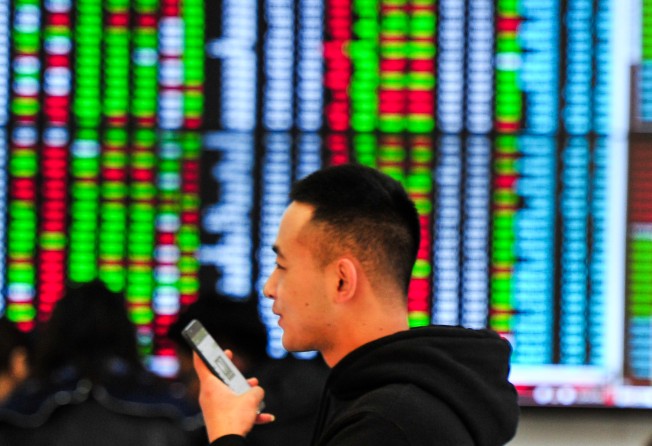Hong Kong and China stocks drop after North Korea threatens to call off talks with Seoul, summit with Trump

The Hong Kong and mainland markets fell on Wednesday, led by property developers, after Pyongyang threatened to call off talks with Seoul. Chinese internet giant Tencent Holdings’ first quarter results were released later in the day.
North Korea said it would suspend high-level talks with Seoul and may reconsider next month’s summit between Kim Jong-Un and US President Donald Trump, if Washington insisted on pursuing a one-sided denuclearisation deal.
Shares in Tencent closed lower by 0.45 per cent, at HK$395.20.
The Hang Seng Index slipped by 0.13 per cent, or 41.83 points, to 31,110.20, dropping for a second day. The turnover of the mainboard was HK$100 billion (US$12.7 billion) on Wednesday, compared with HK$105 billion on Tuesday and HK$106 billion on Monday. The Hang Seng China Enterprises Index was virtually unchanged at 12,440.12.
“Even though corporate fundamentals are not being changed, market sentiment is being hurt by news coming out of North Korea,” said Kevin Leung, executive director of investment strategy at Haitong International Securities. “Tencent results may also come out lower than expected, weighing on confidence.”
The Hong Kong Monetary Authority, the city’s de facto central bank, intervened in the foreign currency market once again to defend the Hong Kong dollar on Tuesday, reflecting capital outflows from the city amid a stronger US dollar and higher US interest rates.
It bought HK$1.57 billion of the currency as the Hong Kong dollar fell to the weaker end of its permitted trading band, bringing the HKMA’s total purchases of its own currency since April to about HK$52.9 billion.
In Hong Kong, Wharf Real Estate Investment was the worst performing blue chip, sliding by 3.40 per cent to HK$61.05. Sunac China Holdings lost 2 per cent to HK$34.30 and China Evergrande Group was 1.78 per cent lower at HK$24.85.
The AIA Group dropped by 0.62 per cent to HK$72.65, knocking 17 points off the benchmark index. Hong Kong Exchanges and Clearing lost 0.38 per cent to HK$260.20.
However, some drug makers bucked the overall weak market. SSY Group, to be included in the MSCI China Index next month, climbed 5.96 per cent to HK$8.53. Yichang Hec Changjiang Pharmaceutical surged by 8.24 per cent to HK$41.40 and Genscript Biotech jumped by 4.30 per cent to HK$30.35. Sihuan Pharmaceutical Holdings was up by 8.63 per cent to HK$2.14.
Earlier this week, global index provider MSCI unveiled a list of 234 A shares to be added in its MSCI Emerging Market Index, through a two-step process in June and September.
“Any support from MSCI’s inclusion of Chinese stocks in the A share market is likely to boost H shares too, given the spread differentials between A and H shares,” said Leung.
HSBC forecasts inflows of US$18 billion to China arising from MSCI’S A-share 5 per cent initial inclusion, before increasing to about US$500 billion over the next five to 10 years, once 100 per cent of all A shares are included.
Mainland stocks were, however, lower as traders awaited news from a second round of Sino-US trade talks in Washington this week.
The Shanghai Composite Index fell by 0.70 per cent, or 22.55 points, to 3,169.57, while the CSI 300, which tracks large caps listed in Shanghai and Shenzhen, decreased by 0.80 per cent, or 31.26 points, to 3,892.84.
The Shenzhen Composite Index eased by 0.41 per cent, or 7.61 points, to 1,832.27, and the Nasdaq style ChiNext slipped by 0.61 per cent, or 11.34 points, to 1,846.67.
China Construction Bank fell by 1.68 per cent to 7.63 yuan, the Industrial and Commercial Bank of China declined by 1.48 per cent to 6 yuan and the Agricultural Bank of China was down by 1.79 per cent to 3.85 yuan.
Hengtong Optic-electric dropped by 1.15 per cent to 33.54 yuan and Zhejiang Huatie Construction Safety Science and Technology shed 2.20 per cent to 6.66 yuan.
Asian markets were mixed: Tokyo’s Nikkei 225 fell by 0.44 per cent, or 100.79 points, to 22,717.23, but the Sydney All Ordinaries rose modestly, by 0.15 per cent, and South Korea’s Kospi edged up by 0.05 per cent.